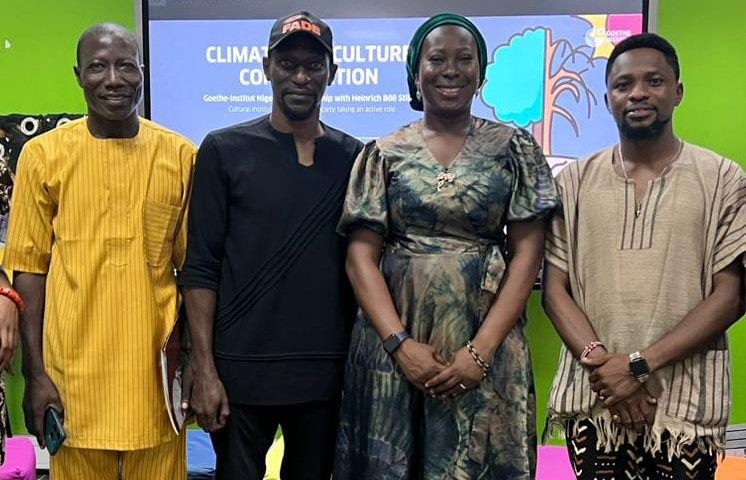
Stakeholders have continued to decry on the adverse effect of climate change on culture, environment, livelihoods and food security.
They, therefore, urged everyone to make something useful out of the changing climate by adjusting practices designed to reverse the climate’s onslaught.
According to them, the climate crisis is not just a matter of scientific data or political policies; it is fundamentally a cultural crisis.
They stated this at a one-day conversation on climate and culture held in Lagos and organised by Goethe-Institut Lagos in partnership with Henrich-Böll-Stiftung. The aim of the conversation was to contribute to global efforts to combat climate change, ensure cultural preservation and work for environmental sustainability and a greener earth that guarantees the future of mankind.
Stakeholders in the one-day climate and culture conversation included the Director of Antiquities and Curator for National Museum, Lagos, Mr. Linus Kasai Kingi, Project Manager of Fight Against Desert Encroachment (FADE) Africa, Mr. Chukwuemeka Jibunoh, Environmental Sustainability Communicator, Mrs. Temitope Okunnu and Co-founder, International Climate Change Development Initiative, Mr. Olumide Idowu. Founder, FADE and DIDI Museum, Dr. Newton Jibunor, addressed the audience in a pre-recorded video.
In his keynote, Deji Akinpelu of REthinking Cities sued for the use of traditional ways of doing things to reduce carbon emissions. “Firstly, let us advocate for and promote non-motorized transportation,”
Akinpelu said. “Encourage the use of bicycles, walking, and other eco-friendly means of travel to cultural events. By doing so, we not only reduce carbon emissions but also foster a healthier, more sustainable way of engaging with our surroundings.
“Secondly, let us support the integration of informal waste collectors. Acknowledge the valuable role they play in our communities and collaborate with them to enhance waste management practices. This inclusivity ensures a more comprehensive approach to sustainability.
“Thirdly, let us champion extended producer responsibilities. Cultural organizations can take a lead by ensuring that producers, especially in the realm of plastics, are accountable for the entire life cycle of their products. This involves reducing single-use plastics, promoting recycling, and actively seeking alternatives.
Odimnfe said climate change is impacting people’s lives directly, indirectly and collectively as a community, adding, “The idea is that we want more institutions to key into this kind of conversation. When it expands, more people will be doing this real work of environmental sustainability; that is to create gardens using composting to grow food or pushing for better disposal of waste.”
Director, Goethe-Institut, Lagos, Dr. Nadine Siegert noted that the conversation is on how to reduce the negative impact of climate change and other environmental issues, noting, “There are a lot of negative impacts of climate change not only on societies but also on culture.
“There are people changing their cultural practices because not everything is available anymore. There is a huge impact of climate change on culture practices, how people have to change because people are not able to do what they do anymore because the surroundings, the ecosystem have changed.”
Founder of environmentally sustainable organisation, FABE International, Okunnu, urged farmers and everyone to promote and sustain Nigeria’s farming culture, urging them to desist from using chemicals on their farm produce. She noted that chemicals being applied to weed or grow foods have a negative impact on human health, adding that chemical elimination will go a long way in promoting a sustainable environment.
Okunnu advocated collective rather than individual action in the fight against climate change, saying, “In a collective process, you influence your neighbour. This brings us to organisational structure. In spite of industrial farming, it doesn’t mean we have to forget our culture. We advocate use of composting for rural farmers instead of synthetic fertilisers or chemicals for sustainable agricultural practice.” Okunnu said her FABE organisation has taken climate change education and campaigns to school children and rural farmers for better appreciation.
Kingi said climate change has really affected culture, especially the work of artists – carvers and weavers using natural materials from forests – who now have a hard time sourcing them due to climate effects that do not allow for replenishment. At the museum, according to Kingi, “We encourage cultural practice, which is evidence of human materials over time. In doing so, we make communities take pride in what their ancestors have done over time.”
He, however, argued that climate change discourse “has been shrouded in intellectual ideologue. The worry is that the discourse has not been driven to the common man’s level for his understanding.”
Idowu said there was need to incorporate indigenous culture knowledge systems into the climate change discourse, saying, “There’s indigenous knowledge that informs understanding of culture and climate,” but regretted that Nigeria was not yet in the equation of serious climate change action, especially curtailing the use of fossil fuel in the foreseeable future. He said the country lacked required action and political will to act decisively.






